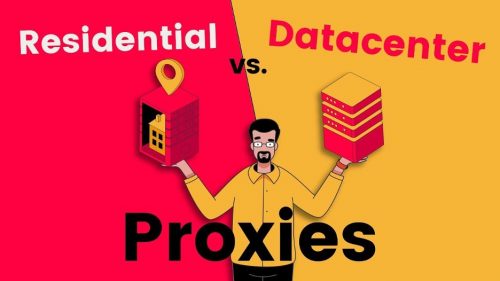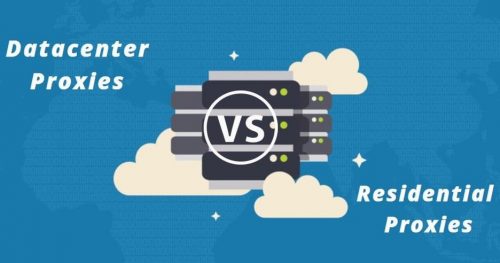
Residential proxy and data center proxy servers help you stay anonymous while scraping, downloading, and uploading torrent data via P2P connections and allow you to access multiple accounts from the same computer or stream geo-blocked content from the web.
Residential proxies are considered the real hardcore proxies because it makes it harder for websites to detect your activities. On the other hand, data center proxies provide a better response rate and are cheaper than residential proxies. Both these two IP servers blocks your real IP location when working on the internet.
This is so important in cases where you cannot access certain websites because your IP is blocked or because of your geo-location and therefore you cannot access some content such as YouTube, Netflix and others.
So what makes residential proxies different from datacenter proxies?
Residential Proxies-what are they?
There are so many devices logged into the internet at any given time, and these devices and websites track these devices based on their connection IPs. So if you are into social media marketing and love using bots for scraping and analyzing data on secured sites, you leave footprints when you perform such actions making your residential IP vulnerable to bans and blacklists.
Fortunately, a residential proxy IP is one effective way to bypass these obstacles.
A residential proxy is an ‘intermediary’ IP address assigned by an ISP (Internet Service Providers), which work similarly to real residential IPs. This address provided by these ISP’s is tied in all cases to physical devices like a mobile phone or a desktop computer.
This means that for every residential proxy assigned, a physical location is compulsorily attached.
Residential proxies are a fantastic way to hide your real identity from online servers because they are genuine residential IPs, and they stand as the gateway for your connection.
Datacenter proxies-what are they?
Datacenter proxies are the most common types of proxies because of their high speed, cheap price -. These types of proxies are not connected or affiliated with any ISPs. Cloud server corporations manage them-like Amazon AWS, Google Cloud, and others, with complete IP anonymity and authentication.
Datacenter proxies are more suitable to perform web crawling and mining data from smaller websites that lack a robust security system and can be used by many at the same time.
So, if you need online privacy or need to access content from another country, a proxy service linked to a data center will help you mask your IP address. However, the downside to this is that more websites are getting aware of this kind of proxy usage and will often block datacenter proxies.
Residential vs. datacenter proxies -which is better?

Residential Proxies or datacenter proxies are both fantastic options for staying anonymous when browsing the internet, and they both offer users the best browsing experience. However, most people prefer to use residential proxies over data centers for different reasons.
Here are a few reasons why you should choose residential proxies over datacenter proxies.
Genuine IP address
For people using residential proxies, security systems trust these IPs because residential IPs are meant for only real residential addresses. The degree of security associated with residential proxies is much higher compared to datacenter proxies. For instance, residential IP addresses give servers the impression of regular household surfing while a high percentage of data center users uses datacenter proxies because they are incredibly cheap and can be bought with just some few dollars
And because datacenter proxies are often easier to acquire, they easily get detected, and their connection can quickly get blocked by websites.
More Expensive
There is a big difference in the prices of these IPs. Residential IP addresses are considerably harder to acquire. They are a little bit more expensive-considering that they have limited providers and have more anonymity levels and low chances of getting blacklisted.
On the other hand, a data center can be shared and managed easily among significant users. Therefore, if you are buying in bulk and on a budget, data center proxies are recommended because it’s cheaper than residential proxies.
Availability
Right now, there are thousands of data center proxies available for use. This is why there is always a replacement ready for any blacklisted IP addresses from datacenters. However, with residential IP’s things are a little different- for instance, there are just a few residential IP providers on the market, with few proxy IPs available for use. These IPs are free from being blacklisted by web servers.
Hard to blacklist
Because residential proxy IPs are provided by real ISP’s it makes it very hard to blacklist such proxies whereas datacenter proxies are created in bulk and are created by cloud server providers and so can easily get detected and blacklisted.
Speed
Datacenter proxies are a bit faster. But, speed is not the main factor. For example, you can access ten pages in two minutes with an ultra-fast IP and be safe. And you can access 100 pages in one minute with a very slow proxy and get in trouble. Residential proxy IPs are more stable and more secure for viewing or scraping data from well-established websites. Fact is, static residential proxies are almost as fast as datacenter proxies while still retaining their stability and security.
Which proxies should you choose?

Choosing a proxy server depends entirely on your workflow-whether it is for high security and legitimacy or faster proxies that will hide your IP.
Legitimacy, safety, and speed are what differentiate the residential proxies from the datacenter proxies. If you are the type that loves to browse the internet anonymously and you don’t want footprints to trigger security alarms, residential proxies are the way to go. Residential proxies are so necessary if your purpose is to scrape data in massive volumes.
Also, data centre proxy infrastructures are not hard to develop. This is so because data centre proxies do not require internet service providers, which is why these proxies are very much available.
All the differences mentioned above should make the choice of residential or datacenter proxies easier. Most online services recognize residential IP addresses as real people compared to those who use data center IP addresses. So as you browse the internet with a residential proxy, your device will appear to be browsing from the ISP customer’s residence.
And in conclusion, both residential vs. datacenter proxies offer your IP addresses a level of anonymity on the internet. Nevertheless, residential proxy holds more security because it is very hard for websites to detect that you are using a proxy. Although this does not mean datacenter proxies are not worth the effort, but the rate with which these datacenter proxies are banned, blocked, or blacklisted makes residential proxy IPS the best choice for your money.
Interesting Related Article: “How Are Proxies Different from VPNs?“

